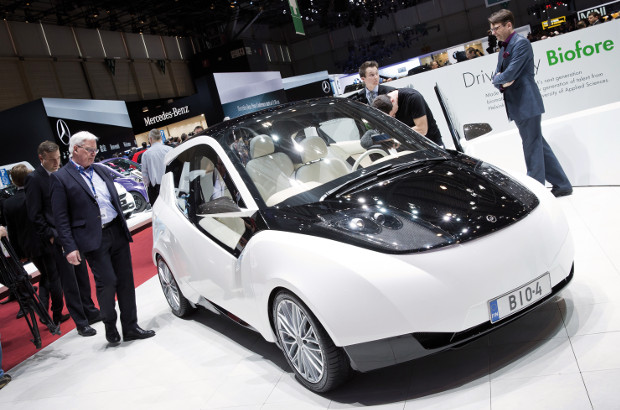Composite, UPM Formi

Case - Published 4.7.2014
The Biofore concept car of UPM demonstrates an innovative use of biomaterials in the automotive industry. In this concept design, the majority of components which are traditionally made from plastic are replaced with safe and durable biomaterials by UPM, for example the UPM Formi biocomposite. The front-end mask, side skirts, dashboard, door panels and internal panels of the car are made from UPM Formi.
Composite materials are made from two or more constituent materials (e.g. metal, wood, plastic or ceramics), which act together but remain separate without blending or merging.
In composite manufacturing, the aim is to maximise the beneficial properties of the materials and minimise their unfavourable properties so that the result is more than the sum of its parts. Biocomposites are composites which contain at least one bio-based composite material.
One good example of biocomposites is the UPM Formi developed by UPM, which is composed of wood-based cellulose and plastic. The material is highly suitable for manufacturing different types of industrial and consumer products, such as furniture and automotive components.
UPM Formi is a material which can be used to replace non-renewable, oil-based raw materials with bio-based materials. Twenty to fifty percent of the composite is made from renewable fibres. Compared with traditional oil-based plastic, it significantly reduces the product’s carbon emissions, and the carbon footprint is reduced by as much as 30-60 percent. The high strength and stiffness of UPM Formi means that structures can be made thinner and lighter, which in turn reduces the consumption of raw materials. This is also an advantage in product transportation. UPM Formi is recyclable and it can also be incinerated. As the cellulose fibres have good flammability, the incineration process produces only small amounts of ash.
The fibres make UPM Formi silky soft and warm to the touch. This is an advantage in many applications, such as kitchen equipment. Because UPM Formi is suitable for injection-moulding, it can be used in objects of all shapes.
UPM Formi has already been used as a substitute for traditional raw materials from plywood to plastics. It has been used in a range of different products, from loudspeakers to kitchen and table ware, furniture, small electronics and kitchen structures.
The UPM Formi biocomposite has been chosen by speaker manufacturer Genelec for its new M Series speakers. UPM Formi provides superior qualities in terms of its ecological properties, production economy and acoustics. Compared to traditional plastics, the natural fibres in UPM Formi enable a high range of wall thickness and superior anti-vibration properties. For music enthusiasts, this means sound is clean and crisp.
Text and photos are from the info cards in the presentation briefcase on the Finnish forest sector. The idea of a briefcase with various kinds of samples to present this diverse sector came from the young people themselves. The briefcase has been handed out at visits to upper secondary schools.
More information on the briefcase and visits: vilma.issakainen(@)smy.fi and anne.kettunen(@)forestindustries.fi.


